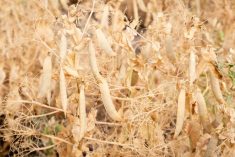Engineers, conductors and train and yard service staff at Canadian Pacific Railway (CP) will return to work by noon local time Tuesday as their labour dispute goes to arbitration.
Federal Labour Minister Seamus O’Regan, attending labour talks between CP and the Teamsters Canada Rail Conference (TCRC) in Calgary, announced Tuesday morning that the parties “have agreed to resolve their remaining collective agreement provisions through binding arbitration,” thus ending a work stoppage that began Sunday.
According to the TCRC, the dispute will be settled using the “final and binding” arbitration process, in which both parties agree to accept an appointed arbitrator’s decision as final.
Read Also

U.S. grains: Soy futures post biggest monthly gain in nearly five years on China trade optimism
U.S. soybean futures climbed to a 15-month high and posted their biggest monthly gain in nearly five years on Friday following a rally fueled by the prospect of revived exports to China.
Normal business operations are to resume Tuesday on CP lines and will continue during the arbitration period, O’Regan said, and at the end of the arbitration period, “a new collective agreement will be established.”
O’Regan hailed the outcome as “further evidence that when employers and unions work together, we get the best results for Canadians and for our economy” and thanked mediators from the Federal Mediation and Conciliation Service who “worked closely with the parties and have supported them throughout their negotiations.”
“The decision to agree to final and binding arbitration is not taken lightly,” TCRC spokesperson Dave Fulton said Tuesday morning. “While arbitration is not the preferred method, we were able to negotiate terms and conditions that were in the best interest of our members.”
CP, in a separate release Tuesday morning, said it “will immediately begin working with customers to resume normal train operations across Canada as soon as possible.”
CP service had halted just after midnight ET Sunday morning, after the company served the union with a lockout notice, saying it had received a strike notice from the union due to take effect at the same time.
Calgary-based CP and the TCRC, which represents about 3,000 CP workers, had been in talks toward a new collective bargaining agreement to replace a contract that expired at the end of 2021.
Disputes over issues including pensions, wages and benefits escalated after the TCRC announced that during a strike vote conducted in Feburary, its members had voted almost 97 per cent in favour of strike action.
While the effects of rail work stoppages on Western Canada’s grain, oilseed and pulse crop growers and handlers have been well documented in previous strikes and lockouts, a work stoppage this spring also stood to choke the feed supply lines for livestock feeders in the region, who have been relying on U.S. corn delivered by rail following last summer’s drought across the Prairies.
Fertilizer Canada executive vice-president Clyde Graham added Monday that due to “poor rail service leading into the spring season,” his group’s members in the fertilizer manufacturing and distrubution sectors were about two to three weeks backed up already on inventories and storage capacity at their plants.
Representatives from groups including Fertilizer Canada, the Canadian Cattlemen’s Association, the National Cattle Feeders Association and Grain Growers of Canada were in Ottawa Monday to call on the federal government to pass back-to-work legislation to end the work stoppage. — Glacier FarmMedia Network












